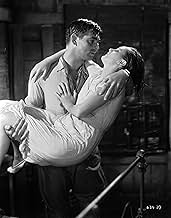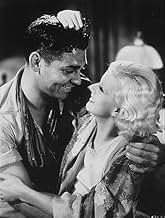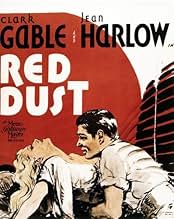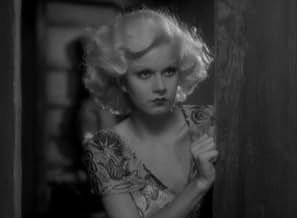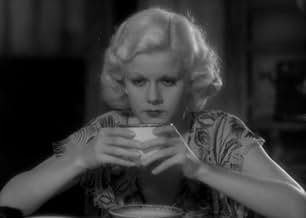VALUTAZIONE IMDb
7,2/10
5176
LA TUA VALUTAZIONE
Il proprietario di una piantagione di gomma ha una relazione con la nuova moglie di uno dei suoi dipendenti.Il proprietario di una piantagione di gomma ha una relazione con la nuova moglie di uno dei suoi dipendenti.Il proprietario di una piantagione di gomma ha una relazione con la nuova moglie di uno dei suoi dipendenti.
- Regia
- Sceneggiatura
- Star
- Premi
- 4 vittorie totali
Recensioni in evidenza
Context is an important element in viewing any work of art or commerce and movies are both. "Red Dust" at it's core is about human weakness and strength, in degree and in full force. Mary Astor, a star since appearing opposite John Barrymore in "Don Juan", plays a repressed wife who doesn't believe in the strength of her husband (Gene Raymond) nor her own weakness when it comes to resisting the animal magnetism of rubber plantation owner Dennis (Clark Gable). Conversely, Gable doesn't realize his weakness in letting himself get involved with the ladylike Astor and underestimates the strength of prostitute Vantine (Jean Harlow) who, when Astor shoots Gable, gives witness to Raymond that his wife is innocent and that Gable deserved shooting. For it's time, 1932, "Red Dust" is sexually progressive, showing the freely running passions of Gable and the two women, while in retrospect, it's depiction of Asians is as poor stereotypes. Willie Fung, who plays Gable's houseboy, is also derided as gay in the script by the line delivered by Jean Harlow. Harlow notices Fung giggling at her underwear, to which she replies "Gee...you even find them in the jungle."
"Red Dust" has a tremendous "back story" as well. John Gilbert was to play the part of Dennis originally as an attempt to bolster his masculine image which had been damaged by the higher-than-anticipated timbre of his voice as recorded by early sound equipment. With the sensation caused by Gable when he returned Norma Shearer's slap in the face in "A Free Soul" Gable's star rose mercurily. No "hero" ever countered the indignation of the leading lady before, and certainly not the divas at Metro-Goldwyn-Mayer. Gable was a whole new breed of leading man. Jean Harlow's star had been on the ascendant after scoring a huge hit in "Red Headed Woman" a scandalous story of a secretary who sleeps her way to the top. The realism of these two performers in those films made them a natural for the raw jungle tale of passion and betrayal. In the middle of the making of the film, Jean Harlow's producer-husband, Paul Bern, was found dead. The scandal that followed frightened the studio who thought that Harlow's career was over. Scandal had ruined the careers of Fatty Arbuckle and Clara Bow, causing their studio (Paramount) to loose millions on their films. M.G.M. was surprised when Harlow's fame and popularity increased. For her part, Harlow returned to the studio and never spoke an unkind word about her late husband. Bern, it turned out, had a common law wife who had emerged from years-long institutionalization and confronted him about his new wife.
Racism is not a key element in the plot of "Red Dust". For that, you would have to see "The Mask of Fu Manchu" where the Asians are neither lazy nor stupid, but sexual predators, instead. Or you could watch any number of other World War Two American movies with Asians in them. But for accurate Pre-censorship Hollywood adult dialogue and plot, "Red Dust" will do nicely, thank you.
"Red Dust" has a tremendous "back story" as well. John Gilbert was to play the part of Dennis originally as an attempt to bolster his masculine image which had been damaged by the higher-than-anticipated timbre of his voice as recorded by early sound equipment. With the sensation caused by Gable when he returned Norma Shearer's slap in the face in "A Free Soul" Gable's star rose mercurily. No "hero" ever countered the indignation of the leading lady before, and certainly not the divas at Metro-Goldwyn-Mayer. Gable was a whole new breed of leading man. Jean Harlow's star had been on the ascendant after scoring a huge hit in "Red Headed Woman" a scandalous story of a secretary who sleeps her way to the top. The realism of these two performers in those films made them a natural for the raw jungle tale of passion and betrayal. In the middle of the making of the film, Jean Harlow's producer-husband, Paul Bern, was found dead. The scandal that followed frightened the studio who thought that Harlow's career was over. Scandal had ruined the careers of Fatty Arbuckle and Clara Bow, causing their studio (Paramount) to loose millions on their films. M.G.M. was surprised when Harlow's fame and popularity increased. For her part, Harlow returned to the studio and never spoke an unkind word about her late husband. Bern, it turned out, had a common law wife who had emerged from years-long institutionalization and confronted him about his new wife.
Racism is not a key element in the plot of "Red Dust". For that, you would have to see "The Mask of Fu Manchu" where the Asians are neither lazy nor stupid, but sexual predators, instead. Or you could watch any number of other World War Two American movies with Asians in them. But for accurate Pre-censorship Hollywood adult dialogue and plot, "Red Dust" will do nicely, thank you.
A very entertaining movie with Gable and Harlow at their best.They really shine in their roles.Also a good performance by a young Mary Astor.It's easy to see that Clark Gable consolidated his newly won fame with this film.He shows his magnificent charisma on the screen perhaps for the first time to full effect.Harlow matches him all the way.An inspired pairing.
A pretty good movie. Red Dust is one of the films that made Clark Gable a star and it's easy to see why. In it, he plays the kind of likable rogue character that audiences would come to know him as. Gable is Dennis Carson, the operator of a rubber plantation in Indochina, who is all business until his world is turned upside down by two women. First Vantine Jefferson (Jean Harlow), a prostitute looking for a place to lie low arrives. Then a prospector and his wife, Barbara (Mary Astor), show up at the plantation. Both women are unwelcome intruders into Carson's world at first, but soon they each end up igniting his desire. Fooling around with the floozy Vantine is easy, but things get complicated when Carson's eye falls on the married Barbara. With his more than questionable actions, any other actor might have been completely unlikeable in the role, but Gable somehow pulls it off. Harlow and Astor also give very good performances. It helps that the heavy subject matter and brash duologue, adapted from a stage play, was not watered down too much for the screen version. Definitely a well made film worth seeing.
Erotically highly charged melodrama that fairly sizzles, even today, more than 70 years later. Cinematography has a plasticity and a sheen to it that makes the film gorgeous to look at, editing is highly efficient and gets the job done and the story told, and the acting is fabulous. I wasn't prepared for the physical impact of the young Gable, how he makes absolutely no excuses for his raw sexuality and libido and how amazingly attractive he was. Harlow as well, I was prepared to find her vulgar and shallow, but she was quite good and certainly had a chemistry thing going with Gable.
Recommended, and please, all of you insisting that this is an inexcusably racist picture, any work of art needs to be judged by its own unique standards, and those of its time. Racism in movies today is a lot subtler, but certainly exists just like it did in the early 30s, and politics or no politics it doesn't detract from the greatness of this genre movie.
Heartily recommended.
Recommended, and please, all of you insisting that this is an inexcusably racist picture, any work of art needs to be judged by its own unique standards, and those of its time. Racism in movies today is a lot subtler, but certainly exists just like it did in the early 30s, and politics or no politics it doesn't detract from the greatness of this genre movie.
Heartily recommended.
The fetid RED DUST of a Malaysian rubber plantation is the setting for an adulterous triangle involving the quick-tempered, rawboned manager, a brassy American prostitute & the upper-class wife of a new employee. Together, they're about to heat up the tropics.
Although blessed with good acting & fine production values, this is merely a soap opera set in the jungle. MGM was pushing the moral envelope here, seeing just how far they could go with libidinous behavior - and in those pre-Production Code days that was pretty far. Clark Gable & Jean Harlow exude sexuality, openly lusting for each other & spreading hormones around the screen. Harlow's lines (of dialogue) are both witty & suggestive, while Gable talks with his eyes and his hands. They were a perfect cinematic match and this film was such a big success that they would repeat the same basic plot 3 years later in CHINA SEAS, although the Code would cause that film to be a bit more covert.
Mary Astor adds a wrinkle to the plot as another fine-looking female for Gable to mate with, but the audience is never in any doubt that gorgeous Harlow will get him in the end. The rest of the cast (Gene Raymond, Donald Crisp, Tully Marshall & giggling Willie Fung) are good in small roles.
It should be noted that the story line contains racist elements, not unusual in a Hollywood film of that era.
By the way, the bedtime story Harlow is reading Gable at the end of the movie is a parody - and a good one - of the animal stories by Thornton W. Burgess which were very popular at the time.
Although blessed with good acting & fine production values, this is merely a soap opera set in the jungle. MGM was pushing the moral envelope here, seeing just how far they could go with libidinous behavior - and in those pre-Production Code days that was pretty far. Clark Gable & Jean Harlow exude sexuality, openly lusting for each other & spreading hormones around the screen. Harlow's lines (of dialogue) are both witty & suggestive, while Gable talks with his eyes and his hands. They were a perfect cinematic match and this film was such a big success that they would repeat the same basic plot 3 years later in CHINA SEAS, although the Code would cause that film to be a bit more covert.
Mary Astor adds a wrinkle to the plot as another fine-looking female for Gable to mate with, but the audience is never in any doubt that gorgeous Harlow will get him in the end. The rest of the cast (Gene Raymond, Donald Crisp, Tully Marshall & giggling Willie Fung) are good in small roles.
It should be noted that the story line contains racist elements, not unusual in a Hollywood film of that era.
By the way, the bedtime story Harlow is reading Gable at the end of the movie is a parody - and a good one - of the animal stories by Thornton W. Burgess which were very popular at the time.
Lo sapevi?
- QuizDuring filming of the famous rain-barrel sequence, Jean Harlow reportedly stood up--topless--and called out something along the lines of "one for the boys in the lab!" Director Victor Fleming allegedly removed the film from the camera to prevent any footage from reaching the black market.
- BlooperWhen Clark Gable and Gene Raymond are in the tree while hunting, after the line: 'This would be a bad country to raise children in, wouldn't it?' Thecloud in the background changes dramatically.
- Citazioni
Barbara Willis: [watching the workers pouring liquid rubber] Why, it's milk.
Dennis Carson: Oh no, just rubber. But you could drink it if you care to stretch a point.
Barbara Willis: Oh, I once knew a man who made a joke like that. He was run over by a truck.
Dennis Carson: Were you driving it?
Barbara Willis: Yes!
Dennis Carson: Well, you're out of luck here. We only have ox-carts and every ox knows me personally.
- ConnessioniEdited into Hollywood: The Dream Factory (1972)
I più visti
Accedi per valutare e creare un elenco di titoli salvati per ottenere consigli personalizzati
- How long is Red Dust?Powered by Alexa
Dettagli
- Data di uscita
- Paese di origine
- Lingua
- Celebre anche come
- Red Dust
- Luoghi delle riprese
- Azienda produttrice
- Vedi altri crediti dell’azienda su IMDbPro
Botteghino
- Budget
- 408.000 USD (previsto)
- Tempo di esecuzione1 ora 23 minuti
- Colore
- Proporzioni
- 1.37 : 1
Contribuisci a questa pagina
Suggerisci una modifica o aggiungi i contenuti mancanti

Divario superiore
By what name was Lo schiaffo (1932) officially released in India in English?
Rispondi
